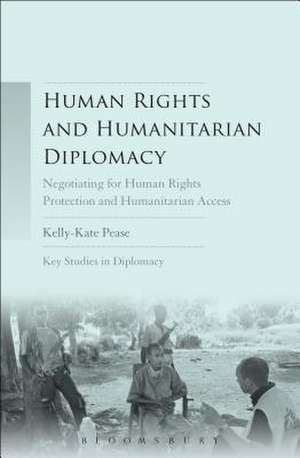Human Rights and Humanitarian Diplomacy: Negotiating for Human Rights Protection and Humanitarian Access: Key Studies in Diplomacy
Autor Kelly-Kate Peaseen Limba Engleză Hardback – 18 noi 2015
Din seria Key Studies in Diplomacy
-
 Preț: 178.40 lei
Preț: 178.40 lei -
 Preț: 206.79 lei
Preț: 206.79 lei - 23%
 Preț: 537.40 lei
Preț: 537.40 lei -
 Preț: 206.25 lei
Preț: 206.25 lei -
 Preț: 205.70 lei
Preț: 205.70 lei - 23%
 Preț: 537.32 lei
Preț: 537.32 lei - 23%
 Preț: 538.31 lei
Preț: 538.31 lei - 23%
 Preț: 569.00 lei
Preț: 569.00 lei -
 Preț: 155.34 lei
Preț: 155.34 lei - 14%
 Preț: 190.96 lei
Preț: 190.96 lei - 12%
 Preț: 259.42 lei
Preț: 259.42 lei - 13%
 Preț: 256.02 lei
Preț: 256.02 lei - 13%
 Preț: 255.84 lei
Preț: 255.84 lei - 23%
 Preț: 725.00 lei
Preț: 725.00 lei -
 Preț: 281.42 lei
Preț: 281.42 lei - 23%
 Preț: 718.18 lei
Preț: 718.18 lei - 23%
 Preț: 777.15 lei
Preț: 777.15 lei -
 Preț: 391.25 lei
Preț: 391.25 lei
Preț: 325.31 lei
Nou
Puncte Express: 488
Preț estimativ în valută:
62.26€ • 64.31$ • 51.81£
62.26€ • 64.31$ • 51.81£
Carte nepublicată încă
Doresc să fiu notificat când acest titlu va fi disponibil:
Se trimite...
Preluare comenzi: 021 569.72.76
Specificații
ISBN-13: 9781623562779
ISBN-10: 1623562775
Pagini: 192
Dimensiuni: 140 x 216 mm
Greutate: 0.45 kg
Editura: Bloomsbury Publishing
Colecția Bloomsbury Academic
Seria Key Studies in Diplomacy
Locul publicării:London, United Kingdom
ISBN-10: 1623562775
Pagini: 192
Dimensiuni: 140 x 216 mm
Greutate: 0.45 kg
Editura: Bloomsbury Publishing
Colecția Bloomsbury Academic
Seria Key Studies in Diplomacy
Locul publicării:London, United Kingdom
Caracteristici
Includes: Discussion Questions; Suggested Readings; Key Terms; Textboxes/Sidebars looking at practical application of concepts
Notă biografică
Kelly-Kate Pease is Professor of International Relations at Webster University, USA. She is the Director of the International Relations Program and was the founding Director of the Institute for Human Rights and Humanitarian Studies.
Cuprins
AcknowledgementsChapter 1: Introduction to Human Rights and Humanitarian DiplomacyWhat are International Human Rights?Why are Human Rights Controversial?Human Rights and HumanitarianismThe ActorsTypes of DiplomacyChannels of DiplomacyTools and StrategiesConclusionChapter 2: The Centrality of the StateTheory, Worldviews, and Human RightsHeads of State and DiplomacyStates and the Development of International Human Rights and Humanitarian LawConclusionChapter 3: Inside the Black BoxInternational Diplomatic Law The Foreign Minister or SecretaryThe Ministry of Foreign Affairs and Human Rights and Humanitarian DiplomacyNational Commissions and the Ombudsman OfficeConclusionChapter 4: The United Nations and Multilateral DiplomacyMultilateral Human Rights and Humanitarian Diplomacy at the United NationsThe United Nations Security Council The United Nations General AssemblyThe United Nations Human Rights Council The Regional Multilateral ArchitectureConclusionChapter 5: IGO Diplomacy and the International Civil ServiceThe United Nations Secretary-GeneralThe United Nations High Commissioner for Human RightsSpecial Procedures: RapporteursIndependent Commissions of InquiryUnited Nations Treaty Monitoring BodiesThe United Nations High Commissioner for Refugees (UNHCR)The Office for the Coordination of Humanitarian Affairs (OCHA)The Regional Civil ServiceConclusionChapter 6: NGO Diplomacy NGO Diplomacy or Advocacy?NGOs as SubcontractorsNGOs as Vehicles for Citizen DiplomacyHuman Rights NGOsNGO Human Rights Diplomacy: Strategy and ToolsHumanitarian NGOsConclusionChapter 7: The Human Rights and Humanitarian ProfessionalThe Professionalization of the Human Rights and HumanitarianismField Diplomacy: The Art of NegotiationThe Human Rights OfficerLawyers Detention MonitorsThe Diplomatic Role of Other ProfessionalsConclusionChapter 8: ConclusionHuman Rights and Humanitarian Diplomacy TodayIlliberal States and IdeologiesFailed StatesGlobalization and BusinessConclusionBibliographyAppendix A: Statement of Ethical Commitments of Human Rights ProfessionalsGlossaryIndex
Recenzii
Pease has authored a cogent and timely book on the 'clumsy and cumbersome' conduct of human rights and humanitarian diplomacy that is accessible and digestible. This is an important text for students and practitioners of diplomacy in all of its various forms.
While many textbooks on human rights tend to focus on legal process and the foreign policies of states, Pease’s important book examines the diplomatic processes that states, state-based actors, and global civil society actors undertake as they attempt to promote and protect human rights, and further develop and define international human rights standards. The book is able to both survey the topic of international human rights in a comprehensive way, while providing new and important insights about how different players interact to develop and implement human rights.
In spite of the rhetoric, human rights and humanitarianism are not yet on the side of the angels. Kelly-Kate Pease spells out with passion yet precision why controversy will continue to surround negotiations, but she also indicates how to make a difference in the next decade.
While many textbooks on human rights tend to focus on legal process and the foreign policies of states, Pease’s important book examines the diplomatic processes that states, state-based actors, and global civil society actors undertake as they attempt to promote and protect human rights, and further develop and define international human rights standards. The book is able to both survey the topic of international human rights in a comprehensive way, while providing new and important insights about how different players interact to develop and implement human rights.
In spite of the rhetoric, human rights and humanitarianism are not yet on the side of the angels. Kelly-Kate Pease spells out with passion yet precision why controversy will continue to surround negotiations, but she also indicates how to make a difference in the next decade.
